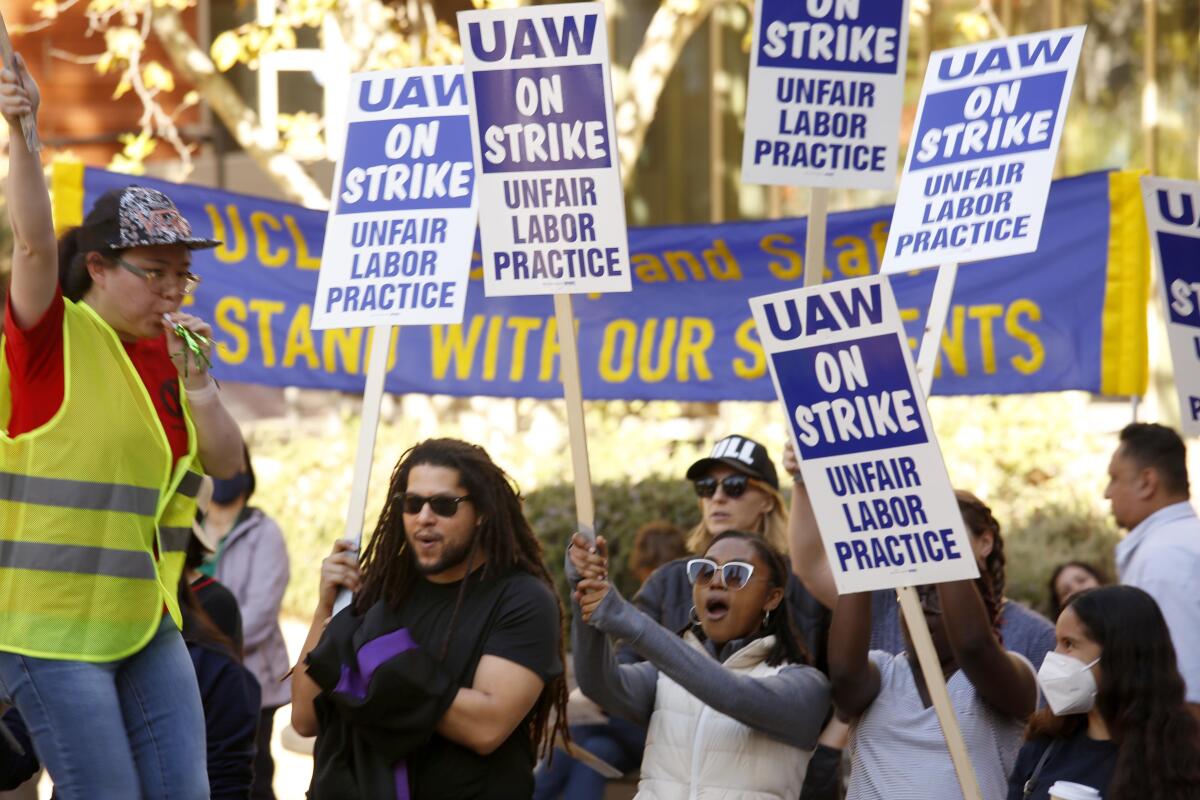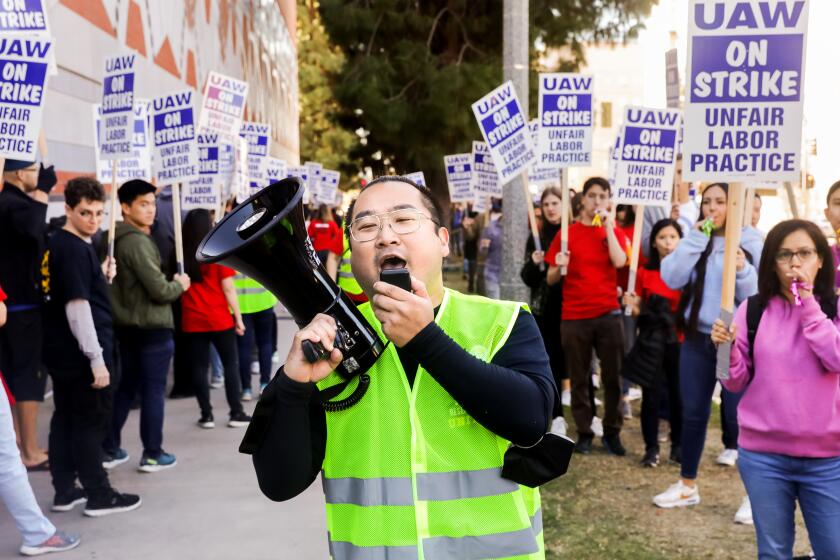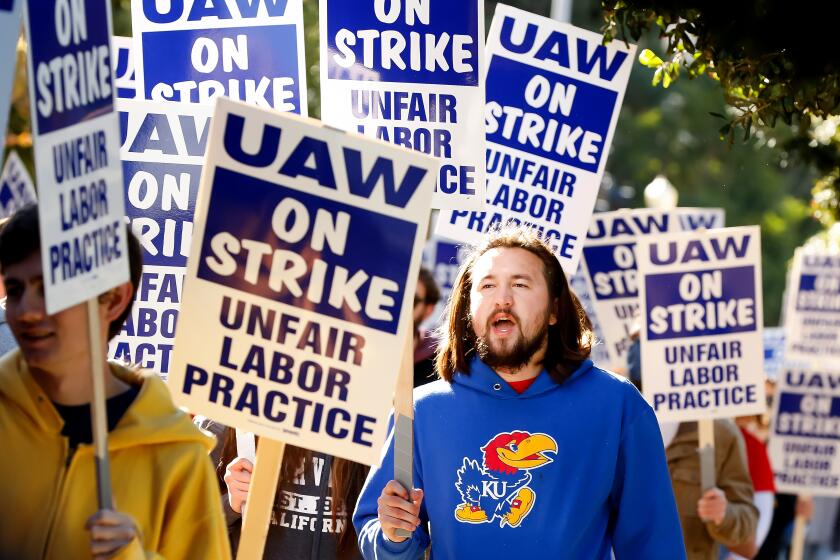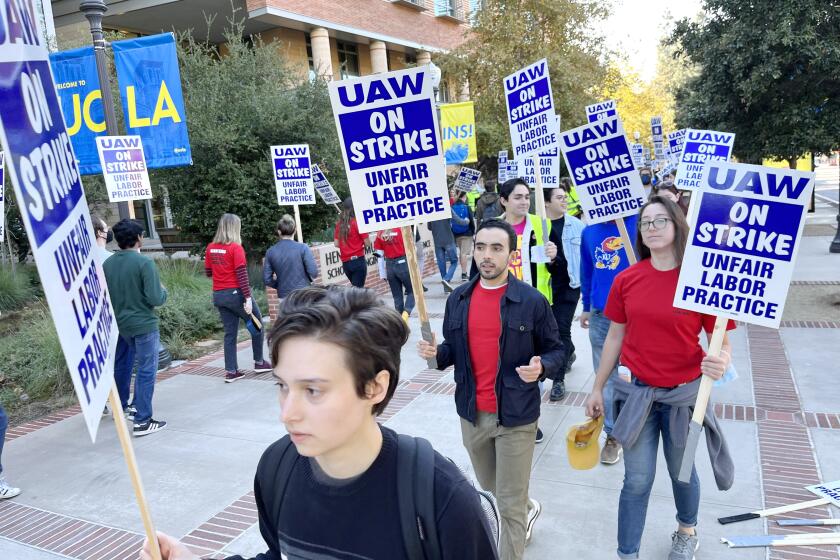Fears rise that UC strike could have long-lasting consequences on vaunted research, teaching

- Share via
As the nation’s largest ever strike of higher-education academic workers enters its third week Monday, with the crunch time of final exams just days away, fears are rising over long-lasting and unintended consequences to the University of California’s core missions of teaching and research.
Faculty in particular are worried that higher labor costs to meet the salary demands of the 48,000 striking workers, without more state or federal funding to pay for them, could force cutbacks in hiring graduate students — jeopardizing the research they conduct and the academic experiences of the undergraduates they help teach. UC grant applications could become less competitive if they have higher price tags, potentially affecting the university’s transformative work in climate change, genetic engineering, economic inequality and galactic mysteries, to name a few areas.
The all-important relationship between faculty mentors and graduate students is being tested, with bitterness festering among some factions. The collective labor action, by four United Auto Workers bargaining units across all 10 UC campuses and the Lawrence Berkeley National Laboratory, is also surfacing long-standing complaints about inadequate state funding for students and misplaced UC spending on “administrative bloat,” as one faculty member put it, over support for academics.
Disruptions over grading are looming, with classes ending as early as Friday on some campuses, and finals starting in the next week or two. In a letter sent to systemwide faculty last week, Academic Senate leaders advised that if the strike continues, they could hire temporary readers or make final exams optional if doing so would not have harmful consequences, such as depriving students of a chance to raise their grades. Faculty can also take advantage of extended deadlines, which some campuses have announced, to submit final grades.
As negotiations resume, the outcome will be a pivotal, high-stakes and widely watched moment for UC, as faculty and striking workers see a critical opportunity to address well-documented shortcomings in support for graduate students in California and beyond.
“Graduate students are essential to our research and teaching; they’re also the future faculty,” Susannah Scott, a chemical engineering professor at UC Santa Barbara, said. “It’s just unthinkable that we can operate without them. It would be really helpful if the state would acknowledge that we have graduate students and that they need to support them.”
In a sign of growing pressure, nearly 300 faculty members at all 10 campuses announced Monday they would not cross picket lines, showing support for the strikers by not teaching classes or submitting grades until the strike ends. The list, which continues to grow, includes such high profile faculty as social activist Angela Davis at UC Santa Cruz, philosopher Judith Butler at UC Berkeley and historian Robin Kelley at UCLA.
“As long as this strike lasts, faculty across the system will be exercising their right to honor the picket line by refusing to conduct university labor up to and including submission of grades — labor that would not be possible without the labor of all other academic workers as well as university staff,” the faculty said in a statement. “We do this toward bettering the working and learning conditions of all students present and future.”
The union is demanding significant pay increases to ease the burden of high rents in the pricey areas where UC campuses are located, along with more support for child care, parental leave, transportation, healthcare and international students. UC’s offers of wage increases don’t come close to meeting union demands but would make academic workers some of the highest paid among comparable public and private institutions, university officials say.
The UC strike is calling for better pay and benefits for teaching assistants, postdoctoral scholars, graduate student researchers, tutors and fellows.
Daniel Pierce, a UC Riverside doctoral candidate in evolutionary genomics, said he and his striking colleagues have given thought to potential unintended consequences of higher wages, such as increases in tuition. But they say UC must come up with an equitable solution.
“It’s concerning to think of possible negative consequences, but it’s on UC to find a balance between supporting academic workers fairly and offsetting some of the economic costs of doing so,” he said.
The problems have been brewing for decades. Since 2000, no fewer than five university task forces have stressed the imperative to address the neglected needs of graduate students — “the soul of the university,” as one faculty leader described them.
In 2012, a joint faculty and administrative working group concluded that UC’s financial support of graduate students was not competitive with comparable rivals, jeopardizing the system’s ability to enroll top talent. In June 2019, just months before UC Santa Cruz graduate students launched a wildcat strike, an Academic Senate study warned of “chronic underinvestment” in doctoral education and the grave risk that it posed to UC’s excellence and California’s economic vitality. And in July, Senate leaders urged UC to form a joint working group to analyze what one called the “fundamentally broken” model of funding graduate education.
“We have seen this coming for decades, so it’s a little frustrating that here we are,” said Sean Malloy, a UC Merced associate professor of history who headed an Academic Senate committee that delivered another warning about support for graduate students in a 2020 letter to Provost Michael Brown.
Malloy credits Brown and other UC leaders for pushing harder for graduate students in recent years. Legislators in June approved Gov. Gavin Newsom’s plan to increase the state allocation to UC’s base budget by 5% in each of the next five years, which will allow for the enrollment of 2,500 more graduate students, among other gains. But Malloy said far more support is needed to raise their pay and benefits.
“If the only way we can have a world-class university is to pay poverty wages and have graduate students sleeping in cars, that’s not a sustainable or ethical model,” Malloy said.
At UC Santa Barbara, Scott exemplifies the high stakes of the labor dispute. She said she is devoted to her 14 graduate student researchers and postdoctoral scholars, supported by several of her federal and industry grants. But the strike has filled her with anxiety.
More than 60% of the striking workers — graduate student researchers, academic researchers and postdoctoral employees — are paid primarily with federal grants secured by their faculty supervisors. But Scott said those grants have remained flat for decades — and don’t go as far as they once did due to rising costs.
A Department of Energy grant she first received in 2003 has been continually renewed but has not increased in size. Her typical National Science Foundation grant of $125,000 per year used to pay for three students but now supports only one, covering salary, benefits, tuition and fees, research and travel expenses and overhead costs, including the 55% paid to UC to operate the research facilities.
As a result, Scott said, she has to apply for more grants to pay for her students, a task that has become a year-round scramble absorbing more of her time. To train one doctoral student during the generally five-year program, faculty in science, technology, engineering and math must raise $500,000, she said.
Scott estimates that a 15% increase in graduate student researcher pay would add $10,000 in costs to her average grant, leaving her with unsavory options in the absence of more funding: hire fewer academic workers, limit their research work, cut funding for travel to important conferences or take a pay cut herself. This scenario, she said, would compromise a defining feature of the UC mission: training future professors and pioneering cutting-edge intellectual inquiries and discoveries.
Some faculty in similar predicaments have proposed that UC lower tuition for graduate student researchers or reduce overhead charges. Others say UC should lobby the federal government for larger grants or more flexibility in the share that can be used for salaries.
The rest of the striking workers — teaching assistants, tutors and other graduate student instructors — are paid through state funding and tuition revenue. Their numbers too could be cut back without more state support or shifts in UC’s budget allocations to meet the pay demands, faculty leaders say.
About 48,000 academic workers across the University of California system remain on strike asking for better pay, childcare support and commuting subsidies.
That could mean fewer teaching assistants, larger class sizes, less personal attention to undergraduates and more work for the remaining faculty and graduate students.
Some faculty say higher labor costs could create an incentive to replace graduate students, who work part time as they pursue advanced degrees, with postdoctoral employees or lecturers, most of whom already have PhDs and are able to teach more classes.
Many also worry about the effect the strike will have on the esprit de corps between faculty and students and the often lifelong relationships they build. Many faculty see mentoring as the crux of their responsibilities, as they guide graduate students to learn research and teaching skills. The grants provide students with some living expenses.
But striking union members say the magnitude of work they perform calls for higher compensation.
One faculty member said she was shaken when an academic worker threatened to file a labor complaint against her after she emailed her graduate students a reminder to keep a record of their research work so she could grade it.
The confrontation underscored the confusion about the line between academic employees’ role as students versus workers. Students who refuse to work are entitled to do so by their right to strike, but they are generally expected to complete their coursework in order to receive credit, according to Academic Senate guidance.
The tensions have prompted the faculty member to consider leaving UC.
The four bargaining units have slightly different demands. They include a $54,000 minimum annual salary for graduate students, which would double the current average, and $70,000 minimum for postdoctoral employees.
Tying workers’ pay to their housing costs could have ‘overwhelming financial impacts,’ for UC. a system provost warns amid strike.
UC has offered salary scale increases of 7% in the first year and 3% in each subsequent year for teaching assistants and tutors, and increases for postdoctoral scholars of 8% the first year, 5% the second year and 3% in subsequent years. UC said pay increases would amount to up to 17%, depending on the union.
But UC so far has resisted the union proposal to tie pay to housing costs. Brown, the provost, said in a letter this month to campus chancellors and senior leaders that meeting that demand would amount to several hundreds of millions of dollars annually, an “overwhelming” financial impact with inflationary pressure and no cap on increases. The union countered with a proposal for a flat 7% annual cost-of-living increase to address UC’s concern about fluctuating housing prices that has not received a response, said Rafael Jaime, a UCLA doctoral candidate and president of UAW Local 2865, which represents 19,000 teaching assistants, tutors and other academic workers.
Faculty leaders systemwide have advocated both short-term housing subsidies and long-term plans to build affordable and subsidized campus housing. But some of those building projects, including at UC Santa Cruz, have been stymied by litigation by environmentalists and slow-growth advocates.
UC also is proposing child-care subsidies and increased paid pregnancy and family leaves, with varying proposals for different bargaining units.
The two sides have made some progress over more than 50 bargaining sessions since last spring. They have secured 95 tentative agreements on issues including stronger protections against workplace bullying and abuse. UC has asked for a neutral mediator to step in, a request the union opposes.
“UC believes its proposals have been fair, reasonable, and responsive to the union’s priorities, and looks forward to continuing negotiations with the UAW and settling these contracts as quickly as possible,” the university said in a statement.
Jaime says UC can afford to be more generous with its multibillion-dollar budget. He and others say UC should lobby for more state funding for graduate student wages and benefits or reset spending priorities, which have long been criticized for boosting the number of administrators more than faculty and other academic employees.
A new Academic Senate study, for instance, found that a class of administrators known as “senior professionals” grew 163.7% between 2011 and 2021, compared with 18.3% growth for tenure-track faculty. The increase in professors has not kept pace with the rising enrollment of California undergraduates, a top priority for legislators who say constituents complain that their children can’t get into the UC campuses of their choice.
UC leaders say many of the managers are needed to handle rising technology demands, increasingly complex requirements of government funding and regulation and student needs that have grown more urgent, such as for mental health.
For now, Jaime has called on UC to step up its negotiating schedule, saying union members are willing to meet around the clock if necessary.
“Many of us are eager to go back to the classrooms and labs, but what’s holding us back is the university itself,” Jaime said.
More to Read
Sign up for Essential California
The most important California stories and recommendations in your inbox every morning.
You may occasionally receive promotional content from the Los Angeles Times.














